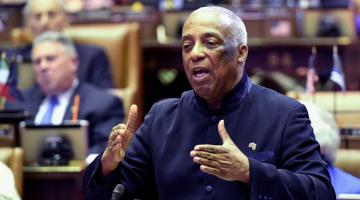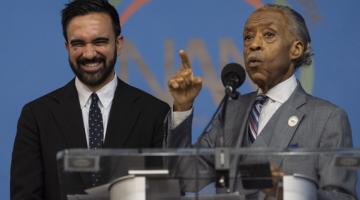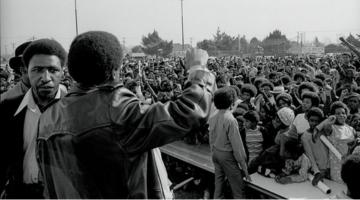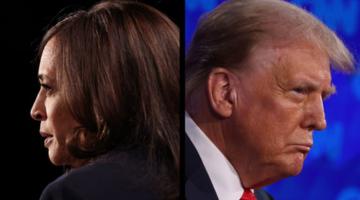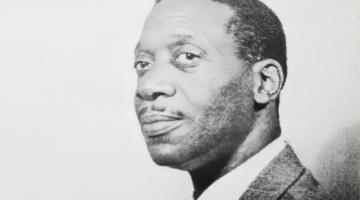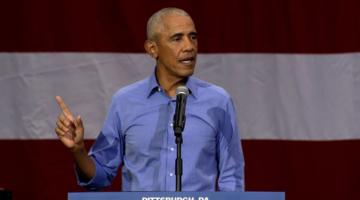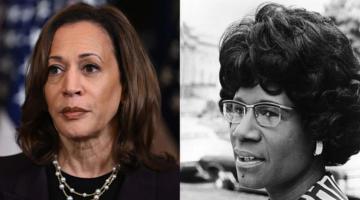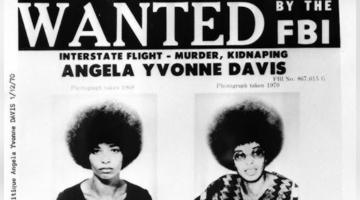The Democratic Party pulls out all the stops to maintain its base of Black voters - except push any policy that will improve their material conditions. Now that Kamala Harris has stepped into the ring as presidential nominee, the machine has turned it up a notch, trying to galvanize Black voters hoping "Black excellence" and other performative tropes will be enough to secure victory.
Almost from the moment she replaced Joe Biden as the Democrat’s presidential nominee, Kamala Harris and her African American surrogates began the bizarre, quadrennial ritual of trying to convince the party’s Black voting base to cast their ballots for politicians who have done absolutely nothing for them. Dressed to the nines, and with their perfectly coiffed hairdos, the phalanx of evangelists from the Church of the Black Boule have spread the gospel on podcasts, cable television news programs and Oprah’s primetime special in an effort, essentially, to put lipstick on a pig.
New Jersey’s African American U.S. Senator, Cory Booker, was one of the first to testify, appearing on Rev. Al Sharpton’s weekly MSNBC’s talk show, Politics Nation, to recount his experiences working with Vice-President Kamala Harris when she was in the U.S. Senate. He told Sharpton:
So whether it was things like being part of the group that was pushing to get Juneteenth a holiday or the anti-lynching bill . . .especially right now with the murder of [Sonya Massey], uh, the urgency for the George Floyd Justice and Policing Act, she co-authored that bill with me and incredible House leaders and members so I know what it’s like to be with her in a foxhole, I know what it’s like to fight with her in the trenches and I’m excited that we’re now in this period where America is going to see just how extraordinary she is. She is a glass-ceiling breaker, she is a history maker and in fights she is a name taker. She is somebody who is relentless, that is prepared, who has a sense of excellence and possibility about what we can make happen together.
With his robotic, charmless delivery, and risible impersonation of the Rev. Jesse L. Jackson, Booker’s endorsement seemed canned, insincere and calculating, as if it was written by the Democratic National Committee to mimic Black speech, not terribly unlike the poison pen letters – from “a Black brother you don’t know” read the most infamous – that the FBI sent to rival militant groups in the 1960s to incite violence. Anyone with even a modicum of respect for the Black religious tradition could be forgiven for watching Cornball Cory’s interview with Sharpton and worrying that at any moment he might begin speaking in tongues, a trauma so horrifying that it could conceivably be passed down from one generation to the next, not unlike chattel slavery.
While we were mercifully spared that spectacle, Booker’s cosplay served as the curtain-raiser of sorts to a presidential campaign that is similar in style to a summer theater troupe, albeit one that does not specialize in the plays of William Shakespeare but in the notion of performative Blackness.
Entertainers in the U.S. first began to darken their skin with shoe polish, burnt cork and greasepaint in the 1830s but the practice reached its zenith after the Civil War; whites wanted to frustrate the freedpeople’s loudening demands by mocking African Americans. Similarly, the minstrelsy that defines Harris’ presidential bid is also an attempt to frustrate Black political demands by deploying an army of African American celebrities, pundits and politicians to gaslight them.
In a contentious interview this month with the Green Party’s presidential nominee Jill Stein, the African American pundit Angela Rye played her role of Angry Black Woman to the hilt, accusing Stein of selfishly being a political spoiler while never winning an election. Stein responded tersely:
“This is the framing of the Empire and the oligarchy and white supremacy and colonialism which wants you to feel that voting is futile. . . “
Rye interrupted: “What you’re not going to say is that I am ever parroting anything at the hands of white supremacy…This is not DNC talking points, this is my research. You have been successful in pushing forth certain agendas as an advocate but you have never won an election.”
Of the measures that Stein endorses is a single-payer healthcare system, or Medicare-4-All, cutting the Pentagon budget, student debt relief, ending Israel’s genocide in Gaza and reparations for African Americans. While these policy proposals enjoy broad support from African Americans, neither Harris nor the Republican presidential nominee, Donald Trump, are in favor. Rye, however, continued to read from her script, focusing on Stein’s electoral losses rather than her popular platform.
You can, in fact, draw a straight line connecting Rye’s performative Blackness on the Breakfast Club to Bill Clinton’s appearance on the Arsenio Hall show during the 1992 presidential campaign. Donning dark sunglasses and playing the tenor saxophone, Clinton’s pedestrian performance of Heartbreak Hotel was, in retrospect, intended to send a subtle message to African Americans that their political grievances would no longer be addressed, but their culture exalted.
By 1992, the Democrats hadn’t won the White House in 16 years and two dueling ideologies were vying for the soul of the party. Advancing from the left was Jesse Jackson, whose 1984 and 1988 presidential campaigns had some success in wooing Black and white workers with progressive platforms. Advancing from the right were the Republicans who were reinvigorated by the Reagan Revolution’s exhumation of Jim Crow politics.
Influenced by the pollster Stanley Greenberg’s research which showed that the white suburban blue-collar workers who voted for Reagan were largely motivated by their racism, Clinton and his running mate, Al Gore, a fellow Dixiecrat, unimaginatively chose the latter. In the 32 years since, the Democrats’ unofficial policy has been to not only cuckold Black voters, but to do so openly in an effort to demonstrate to white racists that the party can brutalize African Americans with as much enthusiasm as their GOP rivals.
Wrote the political scientist Corey Robin: “Clinton intended to ‘win over white voters by declaring to the American electorate: We are not the Party of Jesse Jackson, we are not the Rainbow Coalition.”
This left Black Democrats in a precarious position. Beginning in the early 1990s, African American Democrats abandoned their traditional constituencies of organized labor and Black workers to negotiate what was essentially a Carthaginian peace deal with the party’s white power brokers. In exchange for the bag, African American officeholders agreed to no longer advocate for the community and instead collaborate with conservative Democrats’ plan to reassure racist whites by publicly antagonizing African Americans.
This strategy has produced an entire generation of Black Democrats whose relationship to the African American electorate—and the party—stands in stark contrast to that of their political ancestors. Compare, as one example, Joe Biden’s Flava Flav—Representative James Clyburn—with Chicago’s first African American Mayor, Harold Washington, who said this on the campaign trail in 1983, referring to the city’s late Mayor, Richard J. Daley:
He was a racist to the core, head to toe, hip to hip, there’s no ding or doubt about it. He eschewed and fought and oppressed Black people to the point that some thought that was the way they were supposed to live, just like some slaves on the plantation thought that that was the way they were supposed to live. I give no hosannas for a racist, nor did I appreciate or respect his son. If his name were anything other than Daley, his campaign would be a joke
Like D.C. Mayor Marion Barry or Detroit Mayor Coleman Young, Washington’s relationship with his African American constituents was authentic; none had the need to put on airs, or to split their verbs to overcompensate for their counterfeit, neoliberal politics. The same cannot be said for Kamala Harris, who prosecuted the parents of truant children as San Francisco’s top prosecutor yet as California’s attorney general refused to prosecute bankers who illegally foreclosed on as many as 80,000 homes, or of Maryland Governor Wes Moore, who earlier this year signed into law legislation criminalizing children as young as 10.
Their clumsy attempts to parrot the rhetorical flourish of the Black church reflects an out-of-touch African American political class that is handpicked by white Democrats to replace organic Black politicians such as Barry, Young, Washington, and Representative Mickey Leland, who were products of--and therefore responsive to—the Black grassroots.
Left unsaid in most political debates is that a system known as racial capitalism installs the guardrails for American elections. As such, the central question is not “who wins?” but rather “who gets ahead?” and “what, exactly, is Black?”
The answer to the first is evident: employees can only snatch political control from their employers by setting aside their tribal quarrels and working together as they did during FDR’s New Deal administration, which sparked the most transformative period in modern U.S. history.
The answer to the second, however, is much more complicated, and depends on who is doing the asking. The myopic view of America’s dominant culture posits that “Black” is merely “not white” which is understood as the standard-bearer of intelligence, morality, creativity and sex appeal. But dating back to slavery, there has existed a radical Black polity that has understood Blackness as governed by an African value system that is defined by its intellect, selflessness, sensitivity to suffering and resolve to be free. It is, in other words, not the antithesis to whiteness but the antidote, and cannot be reduced, as Cory Booker and Angela Rye seem to believe, to quips, cadences or a roll of the eye.
In her Breakfast Club interview, Jill Stein appeared with the Green Party’s vice-presidential pick, Butch Ware, an African American Muslim scholar and historian. Speaking of Israel’s origins as an outpost of settler colonialism he defined Blackness as a political identity, saying:
And the Black radical tradition taught me that if we weaponize our Blackness in favor of white supremacy then we become apostates from Blackness itself because Blackness is not a race. . . it is an oppositional ideology. . . an oppositional identity to white supremacy that came into being and that is us.
Jon Jeter is a former foreign correspondent for the Washington Post, Jon Jeter is the author of Flat Broke in the Free Market: How Globalization Fleeced Working People and the co-author of A Day Late and a Dollar Short: Dark Days and Bright Nights in Obama's Postracial America. His work can be found on Patreon as well as Black Republic Media.

